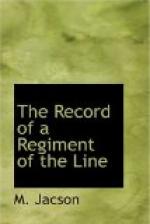After standing to arms daily at 4.15 a.m. till daylight, the Regiment was employed in building long stone traverses, behind which the men were to live, and this work was carried on again in the evening after dark by the light of candles. The dimensions of the traverses were sixty yards long, eight feet high, six feet (of stonework) thick at the top, and nine feet of stonework at the base, the earth from a ditch in front being thrown up at an angle of 1/1. They had a topping of sand-bags, with intervals for air passage; and a tent, stretched lengthways from the top down to ground, afforded the men shelter and accommodation.
On December 22nd a serious catastrophe happened to a party of the Gloucester Regiment, who were quartered in a small traverse near those occupied by the Regiment. A shell caught the whole party of twelve men as they were sitting away from the cover of the traverse. Five were killed, four died of their wounds almost immediately, and three were severely wounded.
A man with a telescope was now placed on the look-out, with orders to blow a whistle if he saw the big gun on Bulwana turned towards the lines when firing; and as the shell took about thirty seconds from the time of the discharge to reach its mark, the warning gave the men time to get under cover.
There were frequently some very amusing incidents when the look-out man blew his whistle. One morning whilst the business at the orderly-room was being conducted, and a culprit being told off, the whistle gave warning that the gun on Bulwana had fired, and in the direction of Tunnel Hill. As all could not get inside the orderly-room shelter, which was merely a hole dug into the side of the hill, there was a general scuttle and sauve qui peut. One officer, trying to get into the orderly-room from outside, ran into another who was escaping from it to get into the first traverse, and each tumbled over the other. The Quartermaster, trying to crawl on his hands and knees under the tenting of the second traverse, got blocked out, and at the same time shut out another officer flying for safety. At the same moment a man jumped from above on the Quartermaster’s back, and he, fancying that it was the shell and that his end had come, gave himself up for lost. All, however, ended happily for the immediate neighbourhood, for the look-out man had made a mistake, and the shell, instead of arriving at Tunnel Hill, crashed into the town.
All these incidents and accidents, individually very serious at the time, were always amusing in the telling as soon as the tyranny was overpast, and, resulting in a hearty laugh, helped to relieve the strain.
The London Gazette of October 9th was signalled into Ladysmith by the 2nd Battalion. This stated: “Major Park to be Lieutenant-Colonel; Davies, 2nd-in-Command; Ellicombe, Major; Radcliffe, Captain.”
A list of prices at this time in Ladysmith at the public auction is of interest:—




